Appreciating One’s Home
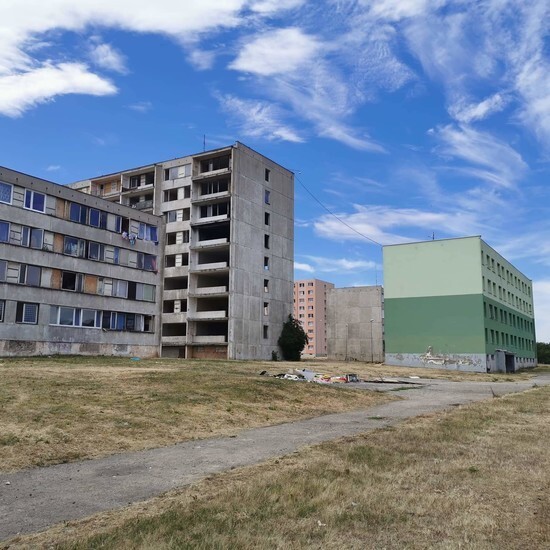
Jan Chromý is a forceful, resolute man who’s lived in the Chanov housing projects for almost 20 years. Having returned home from work, he’s invited me over, as well as municipal representative Adam Komenda and activist Miroslav Brož. The flat is sparkly clean and new floor is being installed while we’re there.
Jan Chromý, originally employed as an engine driver in a mine, feels nostalgic about the previous regime. To hear him tell it, the Chanov housing projects used to be a beautiful place to live. “The flats were amazing! Drying rooms, mangles, an elevator, you’d just ring, and bam! It took only 40 years for one generation to ruin it,” he laments. What upsets him is that some of those who live in Chanov don’t appreciate their homes. The upbringing of some children is problematic in his eyes as they’re not raised to respect rules, or to have manners and responsibility. According to him, though, the fault is mostly with the municipal government which owns the projects and rents the flats to Chanov inhabitants.
“There could be better street lighting between the houses so that I wouldn’t have to worry about my granddaughter once it gets dark. There’s no railing in the buildings, and therefore no basic security measures. Not to mention the complete lack of fire extinguishers which mainly endangers those who live on higher floors; if there’s a fire, they might become cut-off and have no access to help,” he says when asked what should be repaired in the buildings and their immediate surroundings. He’d like Chanov to stop being viewed so negatively in the future. “To me, that means reconstructing the most decrepit houses and locking front doors by 10 p.m. If they’re left open, callous people can get in, such as thieves. What I really want is for Chanov to be the same as when it first opened. And for the people to appreciate it, to appreciate their homes.”
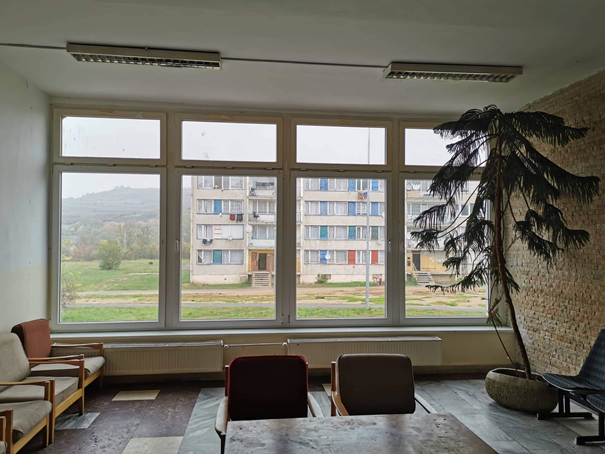
Portable buildings as the last opportunity to have a decent living?
Jan’s belief that locals don’t appreciate their housing which is the reason for the current situation in Chanov, is shared by Jiří Nedvěd, a councillor of the city of Most and a member of the ProMOST political movement. Nedvěd promotes the construction of modular houses. “There needs to be some housing for those who quite clearly aren’t able to live like decent people and keep demolishing their flats in panel blocks. My view is that such housing should be the last opportunity to have a decent living. Everyone deserves a last chance and it must be made perfectly clear this is precisely that.”
It’s debatable whether the construction of portable buildings will be functional in the future, or whether it’s a good place to raise children. But these aren’t the questions that are likely to be asked by the councillors in Most. The main priority seems to be to proof modular houses against destruction. That’s why flats are also going to be protected against vandalism. “Mainly by making it impossible to access wiring and other distribution systems, or using resistant cladding materials which can’t be destroyed, unlike standard thermal insulation,” says Nedvěd when asked about the advantages of such buildings.
The local government for Most was inspired by the city of Vsetín where such houses already exist. Nedvěd believes they’re fulfilling their purpose. “It was great to see some of those people keep their flats clean and actually make an effort. Personally, I think it’s thanks to the repression that was enacted against them. The modular housing in Vsetín is the last stop; after that, there’s only life on the street.”
However, the Romani in Vsetín don’t share the enthusiasm of the Most councillors, and have visited Chanov to support the local opposition. On that occasion, they shared their first-hand experience. Those who’ve been living in modular housing for years, particularly complain about the insufficient thermal and acoustic insulation which prevents them from cutting their power costs down; of bad ventilation and inescapable humidity, disintegrating walls, or rodents and insects which are common in their flats.
Councillor Nedvěd is open to the suggestion from the Department for Social Inclusion to gradually wind down the Chanov projects and move the locals into the city, provided they can abandon their “harmful” way of life. “Once those from Chanov start acting like decent people, stop abusing the welfare system, start actually looking for a job, stop working under the table to avoid a distraint, start paying off their debts, stop bothering their neighbours, and acquire basic hygiene and social skills, I’d be happy to personally welcome them in Most,” says Nedvěd, adding that the Chanov inhabitants prefer a “lifestyle which is very different from the way we live. Hanging out in front of your house and playing the guitar, to mention a few things, just isn’t done in the city.”
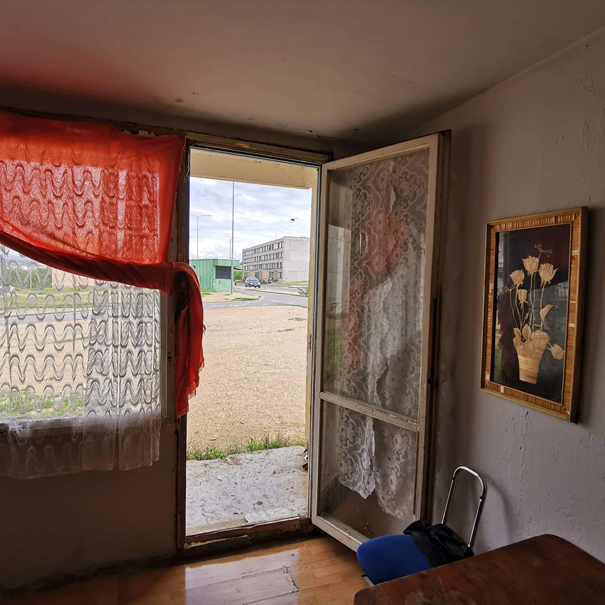
Can a modular house be turned into a home?
A home can have different forms and everyone prefers something different. A digital nomad might require social media to contact their loved ones; those who love nature might need a forest to walk their dog, hills where they used to go on trips with their families as children and which they know like the back of their hand. Others associate “home” with trinkets, passed down in their family for generations, or a family home whose walls remember every joy and worry experienced by the people living there. And others know they’re home when they smell their favourite meal. Experts who study the notion of home, claim that “home” can’t be reduced to “a roof above my head”; it’s shaped by relationships between people, ownership, and independence.[1] “Home” tends to be associated with having a social environment, i.e. family, and a place to return and retire to. In summary, a home consists of a social environment on one hand, and physical privacy on the other.[2]
Simply put, we feel home there where we experience a sense of security, support, and safety; it’s a place we know. This can’t be achieved with modular housing, considering the lack of privacy. One of the reasons why the Chanov locals reject the town hall’s offer of new housing is that they already have a home and would like to repair it on their own. Tellingly, this is evidenced by the fact that the Romani who were moved out of Block 3 and were lucky enough to rent a place in Most, return to Chanov every day.
“Most of them are old residents who were born in Chanov and went to elementary school there. It’s hard for them to say goodbye. A lot of them cried when they had to leave No. 3. They spent their whole lives there. Although they moved to Most, they’re here every single day. If No. 6 and 10 were combined, they’d be back. This is their home,” says Jan Chromý, their former neighbour. Chanov is a home to him as well which is why he attempts to repair the houses and involve the locals.
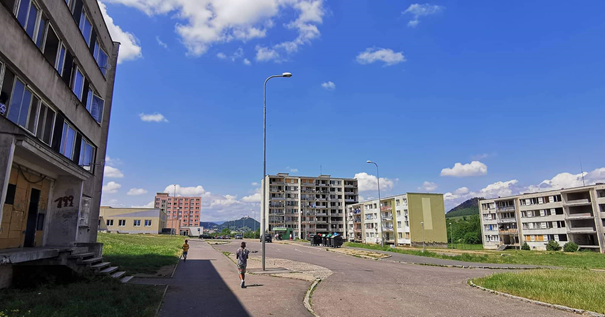
Silenced and ignored
“We live in a free country. The previous, totalitarian regime is gone. Politicians have to communicate with us now,” Chromý evaluates what the past three decades have brought to the locals. However, it’s very hard, even impossible for him to have a dialogue with the city mayor and ProMOST representatives. In collaboration with the Most representatives of the Pirate and Green party, he formed an action group to promote the reparation of damaged blocks, and started a petition against the construction of modular housing, signed by over 100 people, i.e. almost everyone concerned. The majority of them would be willing to take part in the repairs as they have relevant experience. Chromý himself worked with the town hall when Chanov houses were being repaired in 2013. However, Mayor Jan Paparega refused a meeting to discuss the petition and required measures, and didn’t offer a replacement date. Chromý attended a municipal government meeting and tried to get hold of the mayor, but even though he’d arranged a visit and had it confirmed by the secretary, he didn’t manage to actually talk to him. Maybe the mayor found inspiration in the approach of Councillor Nedvěd who flat out refuses to negotiate with the local Romani. “Regarding the so-called ‘locals’, I’m only willing to deal with those who can prove they really want to be treated like any other decent citizen. To me, this means that such a person has a job or is verifiably looking for one, and fulfils their obligations. So far, I haven’t been contacted by one.”
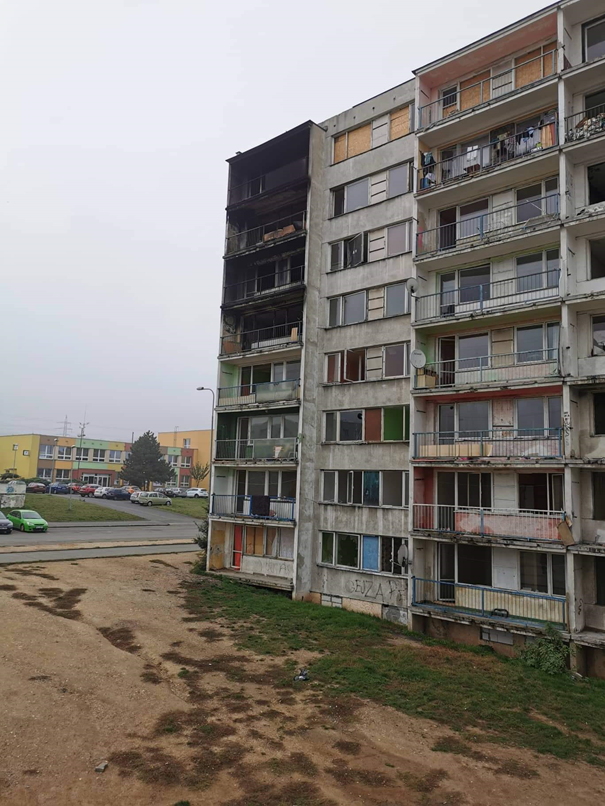
Does the city help increase the indebtedness of its citizens?
When I confront Jan Chromý with Nedvěd’s words, he becomes angry and mentions the huge water leaks of which he’d informed the Alarm website as early as October. “Why doesn’t he take a look at the water leaks that were happening in No. 3 back when about twenty families still lived there? The city should have sent people from the emergency department, have them look into the situation and prevent further leaks. That way, people wouldn’t run into debt without reason. Some of them were required to pay almost 300 or 400,000 crowns! According to my wife, we were charged almost 90,000 crowns. There’s no way we could have ever used up so much water!”
Adam Komenda, a representative of the Pirate Party for the opposition, adds: “The city is also drawing up a decree to make Chanov inhabitants pay for waste collection, which is free for other people in Most. When it was mentioned in the news, the Constitutional Court announced in advance that any such decree wouldn’t be accepted and would in turn be abolished. But Mr. Nedvěd kept defending it, saying that only decent citizens have the benefit of having the city pay for their waste collection. Meaning that those who are in debt would fall deeper into it. This would affect not only the Romani in Chanov, but also single mothers and many others.”
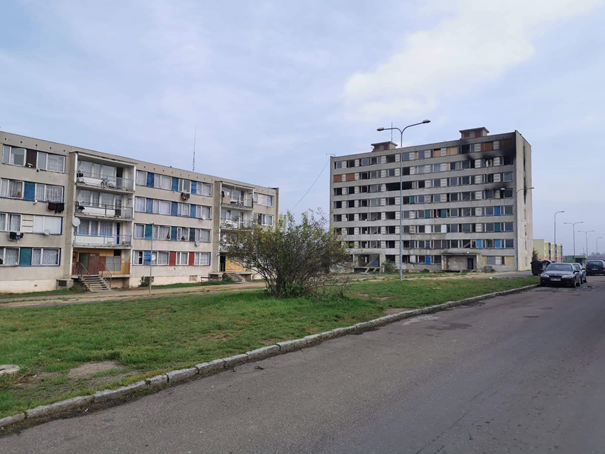
Bad Expectations
And what about those who’d like to leave Chanov? According to Chromý, this in no way applies to the elderly who have their home there and don’t want to build it elsewhere. They also can’t afford renting in the city on their small pensions. But some young people are trying to move. However, after a short period of time, they come back, often having financial issues.
“They can’t earn a living here because there isn’t a single person who’s graduated from a technical school, for example, and could ask for an adequate salary. Most of the locals barely managed to receive their elementary education. Over here, it wasn’t necessary to be educated. This is the legacy of those mines and chemical plants which didn’t require trained workers,” Chromý explains, adding that low-skill workers now earn too little to leave Chanov.
Miroslav Brož, an activist, says that when northern Bohemian factories were closed in the 90s, the region suffered from a structural unemployment of up to 25 or 30 percent which affected all inhabitants equally. Suddenly, the unemployment office was full of high-skilled, educated people. The Romani who used to help out at the factories couldn’t compete with them. Today, they do work, but earn very little and it’s hard for them to make ends meet. This doesn’t apply only to the Romani; most of those who live in northern Bohemia struggle with the same issue.
The effect of structural unemployment and the sheer number of socially excluded locations in northern Bohemia are felt by Councillor Nedvěd, too. According to him, people in Most address the issue differently to those in Prague, for instance. “The difference is in the number of such people, as well as in the finances available to the city and from the private sector. Where do you think all those are who’ve been destroying the Karlín neighbourhood for so many years? Do you think you’ve managed to include them in the general population in Prague? No, you haven’t. Those people are now here in the north, moved there by real estate agencies thanks to a crafty housing policy.” When asked if he feels sufficiently supported by the government in regards to solving the issue, his answer’s in the negative. “In my view, the current situation is pretty ideal for the government. Seventy percent of cities have been cleansed at the expense of long-handicapped towns, such as Most. Why didn’t they socialise those people in their own cities while they were still there? Why should we, here in Most, role play as the Red Cross and deal with every single asocial person in the Czech Republic and Slovakia? And has anyone actually manage to socialise them?”
Chromý, however, doesn’t believe that the greatest problem lies in the government’s insufficient participation in resolving the social situation in Most, or combatting the effect of structural unemployment in the region, first experienced in the 1990s. According to him, the non-existent communication and cooperation with the current municipal authority is the greatest obstacle. “Unless they work with us, look for mistakes, and make certain corrections to make it work so that people don’t come here all the time, taking pictures and humiliating the locals, then the situation will remain as it’s now. And it could remain such for the next 50 years,” he concludes sadly.
Author of the photographs: Miroslav Brož
[1] HEJNAL, Ondřej. Sociální studia/social studies: “Naše ruiny jsou naším domovem“: Bezdomovci, domov a sociální organizace 2011. C2014 [cit. 9.12.2019]. Available at: https://journals.muni.cz/socialni_studia/article/view/6041/5174.
[2] MAREK, Jakub, STRNAD, Aleš, HOTOVCOVÁ, Lucie, 2012. Bezdomovectví v kontextu ambulantních služeb. In: AUGUSTOVÁ, Karolína, 2015. Rizikové faktory ženského bezdomovectví [online], Informační systém Jabok, archiv závěrečné práce Karolína Augustová Jabok B ETF, [cit.9.12.2019]. Available at: https://is.jabok.cz/th/6281/jabok_b/?id=3501